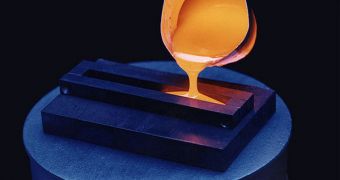Scientists have recently developed a new type of material that could in the near future lead to an entirely new paradigm shift in the way we choose to protect various sensitive equipment, objects and environments. Spray-on glass is a substance that, when applied to something, creates a very thin protective layer, that is very easy to clean, and which can protect from UV radiation to invading fungi.
It could be used on the nose of high-speed trains and in vineyards, as well as on a vast array of commercial products that need to be kept away from the harming effect of being exposed to the environment, The Telegraph reports.
The innovation could also be used to protect against spreading disease, its creators claim. It can safeguard various materials against bacteria, radiation, water, dirt, and other such contaminants that would otherwise adhere and become embedded in these materials. The best thing about this very thin layer of protective agent is that it is absolutely harmless to the environment. This means that it could very soon replace an entire range of other cleaning products that relay on harsh chemical agents to clean surfaces ranging from toilets and dishes to sensitive electronics that go on satellites.
The layer is only one millionth of a millimeter thick, and is made up almost entirely of pure silicon dioxide. The material is water-resistant, which means that things covered in it could be washed using water alone, rather than bleach-based solvents. Chemists report that sterile surfaces covered with the thin layer of silicon dioxide were equally as clean after being washed in hot water alone, as they would have been if they had been cleansed with strong bleach.
Nanopool, a German company, is at this point the owner of the patent for the new material. According to the newspaper, it is currently engaged in talks with various UK-based firms, as well as the National Health Service (NHS), to see how they could use the liquid glass in practical, large-scale applications. What is likely to make adopting the new product very easy is the fact that the layers which form on the protected surfaces allow the material underneath to breath. They are also flexible.
“Very soon almost every product you purchase will be protected with a highly durable, easy-to-clean coating […] the concept of spray-on glass is mind-boggling,” told The Independent Neil McClelland, who is the UK project manager at Nanopool.

 14 DAY TRIAL //
14 DAY TRIAL //